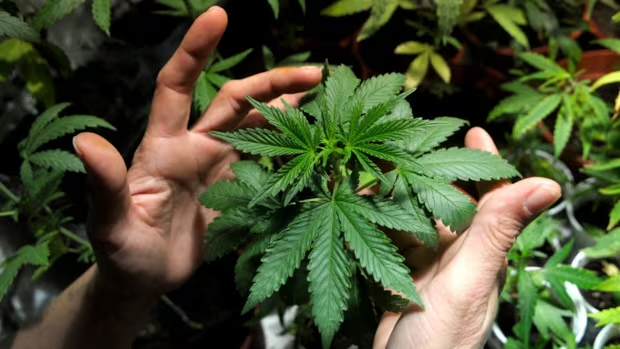Pollen, peaches, and penicillin are just a few examples of the substances found in most plants, foods, and medications that can cause allergy symptoms. Cannabis can also be added to that list.
The symptoms of a cannabis allergy vary depending on whether you are exposed to the plant or its derivatives through ingestion, inhalation, or skin contact. Itching, swelling, symptoms of cold and asthma, and digestive problems are typical reactions.
Although they only affect about 1% of people, cannabis allergies can have negative effects that necessitate lifestyle adjustments. In severe situations, allergic reactions might require emergency care.
Online Medical Card is here to provide you with practical advice for navigating your treatment options if you use medical marijuana and think you might have a cannabis allergy.
What Exactly Is a Cannabis Allergy?
Allergies is the term used to characterize how some people react to substances called allergens. Four of them are found in cannabis.
Cannabis allergens may trigger an immune response, but it isn’t very beneficial, even though they have no effect on most cannabis users.
Some people’s bodies release immunoglobulin E (IgE) in response to cannabis allergens, which instructs the body to release histamine, triggering all of the traditional allergy symptoms.
Allergies are erratic and unpredictable. The first time you use cannabis, you might get symptoms, but it’s equally likely that you won’t get any until you use it repeatedly.
Without observing your reaction or consulting a qualified allergist, it is impossible to determine whether you have a cannabis allergy. However, cross-reactivity is one method of making an educated guess.
Some allergen compounds are present in some foods. According to the theory, if you have an allergy to one of these substances, you are more likely to have a cross-reactivity, or allergy, to any food that contains it. Cannabis and other foods are no different.
You may be more susceptible to developing a cannabis allergy if you already have an allergy to one of these foods:
- Almonds
- Apples
- Bananas
- Chestnuts
- Eggplant
- Grapefruit
- Peaches
- Tomatoes
Common Symptoms of a Cannabis Allergy
Pollen allergies and cannabis allergies are very similar. Most of the symptoms of a cannabis allergy are already familiar to you if you frequently experience an itchy, eye-watering discomfort and a constantly runny nose in the spring.
How you come into contact with cannabis is the main factor that will determine how you react to an allergy to it. The effects of eating cannabis will differ from those of touching cannabis flowers.
If you have an allergy and cannabis comes into contact with your skin, it could result in:
- Redness
- Dry, scaly, or itchy skin
- Rash or hives
Additionally, you may experience an allergic reaction to cannabis smoke or pollen, which frequently results in cold-like symptoms or asthma, such as:
- Wheezing, coughing, or difficulty breathing
- Sore throat
- Stuffy nose
- Irritated eyes
- General itchiness
Lastly, consuming edibles or oils containing cannabis may cause an allergic reaction.
Along with a few of the symptoms of inhalation, you might also have:
- Swelling
- Stomach pain or discomfort
- Diarrhea
The severity of cannabis allergy symptoms varies. Although extremely rare, a severe cannabis allergy is possible; most people will only feel mild sensitivity and discomfort. Any contact with cannabis can cause an extreme allergic reaction known as anaphylaxis in people with severe cannabis allergies, which calls for medical attention.
Anaphylaxis symptoms include:
- Severe difficulty breathing with rapid, shallow, and wheezing breaths
- Swollen face and airways
- Sudden drop in blood pressure
- Fast and irregular heartbeats
- Extreme diarrhea
- Lightheadedness or fainting
- Feelings of anxiety or dread
If you ever experience these symptoms, please get emergency help right away because anaphylaxis is a potentially fatal condition.
How Cannabis Allergies Are Diagnosed
Most common allergies can be diagnosed by a doctor using a blood test or a skin test. Despite the possibility of receiving a false positive or false negative, testing is still the most reliable method of diagnosing allergies.
Well-known instances include:
- Skin prick tests: Using a tiny needle containing the allergen you’re testing for, your doctor will prick a section of your skin to determine whether you react to it. If you are allergic to it, symptoms will appear in 15 to 20 minutes.
- Patch tests: Although less invasive than skin prick tests, patch tests take around two days, give or take, to develop and provide results. Your doctor will apply an adhesive patch coated with an allergen to your skin during this test to see if it triggers a reaction.
- RAST tests: A RAST test can be performed on your blood if you and your doctor are concerned that a skin test may cause a severe allergic reaction. After adding an allergen to a blood sample, your doctor will watch to see if your IgE levels change.
These tests can also be used by doctors to identify cannabis allergies. However, there are currently no standardized testing procedures for cannabis allergies, unlike for common allergies like tree nuts and shellfish. Alternatively, your physician may create their own cannabis allergen mixture for testing.
It is hoped that physicians will create standardized protocols for cannabis allergy testing as cannabis use becomes more widely available and accepted.
How to Manage and Overcome Cannabis Allergies
Ideally, you should stay away from cannabis use and contact if you have an allergy to it. However, it’s not ideal if you’re a medical marijuana patient who depends on cannabis for treatment.
There are several strategies you can try to control cannabis allergies and sensitivities:
- Take allergy medication: To alleviate symptoms, people with allergies frequently turn to prescription and over-the-counter (OTC) medications. These drugs can also be used to treat a cannabis allergy. Both decongestants and antihistamines can effectively treat mild allergy symptoms.
- Ventilate your space: Ventilate your area because, whether or not you have an allergy, cannabis smoke is a potent irritant. Open your windows and turn on fans to let some fresh air into your room, or think about smoking cannabis outside.
- Properly store your cannabis: Improper storage of cannabis can lead to the growth of mold, another common allergen. To keep your supply fresh and as allergy-free as possible, make sure to store it in an airtight container in a cool, dry, dark place.
Unfortunately, these precautions won’t be sufficient to keep you safe if you’re among the very few people who have a severe cannabis allergy. Always keep an epinephrine auto-injector (EpiPen) on hand in case of emergencies.
According to some experts, cannabis allergies will become more common as cannabis use increases. Don’t give up if you have a cannabis allergy now or are afraid you might get one in the future; there are still things you can do.
When to Seek Medical Help for Cannabis Allergies
You might be willing to tolerate a little itching or congestion if you’re using medical cannabis to treat a condition that has a big influence on your day-to-day activities. A calmer mind, better sleep, or holistic pain relief may be worth the small price.
However, discuss your symptom management options with your medical marijuana doctor if your cannabis allergy outweighs the therapeutic benefits of cannabis use.
And don’t forget to contact emergency services right away if you ever experience a severe cannabis allergic reaction.
Online Medical Card: Your Online Guide to Medical Cannabis
Don’t let the remote chance of having a cannabis allergy prevent you from applying for a medical marijuana card. Find out more about cannabis’ potent effects and how to begin healing right now.
In addition to speed and convenience, the top online medical marijuana card service should provide skilled, caring medical care. All of this and more is available with OMC.
You will have instant access to dispensaries and their products after one of our state-licensed providers recommends medical marijuana for you. Additionally, you’ll remain in touch with our network of medical professionals who can offer you tailored guidance on anything related to cannabis, including cannabis allergies. Plus, if you’re looking to grow 99 plants in CA, our experts can provide the necessary information and legal guidance to help you navigate the process.
To learn more, make an appointment right now or have a conversation with a member of our committed staff.




